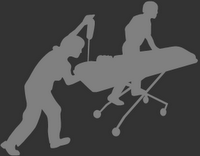
A year ago, I was about to graduate from the University and I anxiously awaited the results of my medical school applications. I was fairly confident that I could get into medical school -- I had good grades, a great score on the MCAT and some stellar recommendations from my PI, professors and people I've volunteered with. However, one little comment had been niggling in the back of my mind. I remember having a great interview with the Dean of admissions at my med school of choice and he said "so, what sort of medical-related work have you done recently?"
Without a doubt, the Dean had found my application-Kryptonite. I stumbled a bit in answering and I managed to collect myself enough to pull up my 6 month stint volunteering at an ER (doing next to nothing,) but that was ALL THAT I HAD DONE. Truly, I considered my academic work in college to be so important in my quest to get in, that I had not given myself the chance to explore.
Med schools across the nation unanimously decided to reject me. It should not have come as a great surprise to me, but it was a blow to my (rapidly deflating) ego.
Fast forward a year. I spent a while finding various "preceptorships" in the most basic sense, shadowing two different family physicians and a group of gastroenterologists. My mother had just started working as the director of a rural community health center and I did not hesitate to ask her for some new experiences. (Regrettably, I dismissed a lot of her offers while I was in college out of pride and independence.) I learned a lot, especially from the family doctor who worked out of a small trailer at my mom's rural community center. The doc took me rounding with her in the hospital, into community-planning meetings (to expand services and make a greater impact with other organizations) and through routine scheduled appointments. I had the chance to see the most exciting, as well as the most dull work she had to do.
There were two parts to the dullness I eventually learned to eliminate. One part was that even though I was in the exam room, I was supposed to be a silent lurker. The lack of interaction made me feel disconnected, especially when I wanted to comment on something. The other part was my ignorance. I was afraid to talk and ask questions (especially if the patient was right there) about certain things going on, because I didn't want to seem super clueless.
What I learned from my preceptorships was exceptional mindfulness. Even if I couldn't ask questions when the patient was there (to avoid looking stupid and potentially embarrassing them,) I could ask about it later... and learn more on my own. I took it upon myself to learn about lab tests and the significance of the most common results. I drank in the doc's methods of history taking and patient communication -- each doctor had their own personal style driven by their particular circumstances -- but they all had a few things in common.
- Sit down. Don't make them feel rushed.
- Listen to the patient's concerns. Provide feedback and don't concentrate on note-taking.
- Address their concerns and discuss your own with them (usually in an efficient manner)
- Be comfortable.
A simple consent to allow me to sit in the room with their doctor and listen to their personal details made it all happen. The key of a doctor-patient relationship is honesty and openness. I was a part of this bond of trust because I was there, listening to confessions that they might not even make to close family members. The reason they let me in the room at all, despite being a clueless and fidgety pre-med student, was precisely because they knew I was a clueless and fidgety student. They felt that they had a great doctor.
Many times I was told how much they loved their doctor. Not everyone has this experience and a few bad examples embitter people towards the profession as a whole. All of these doctors started off knowing as little as I did. Many of them made the same mistakes as I did, concentrating on learning biological mechanisms of disease and ignoring the humanism implicit in medicine. Patients know this. They knew that in order for me to be a better person, I had to learn from great examples.
I had half a dozen great examples to learn from, each with their own lessons of personal communication to impart. I am grateful that I was rejected the first time I applied for medical school. BAM. This humbling experience allowed me to take my time and explore the personal side of medicine. These lessons will stick with me. It came easy for me to read books to be good in my academic study. Reading people, on the other hand, comes hard. Relating to people is an ongoing process requiring constant mindfulness.
It might be OK to skim a patient's chart, but it is never OK to skim a patient.
I wish I could attribute these words to someone wise, but they are just my own. Perhaps in a fit of wisdom as an attending or preceptor, training some young n00b, I might be able to pull this line off as some grand insight.





you will go far, young jedi.
ReplyDelete